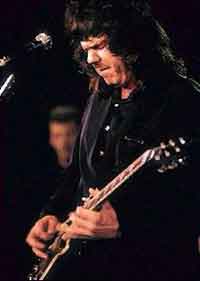
Artist Website: www.gary-moore.com
About Gary Moore
Gary Moore moved from Belfast to Dublin when he was 16 and joined Skid Row; even at that early age his playing was extraordinary. In the early 70's he formed his own band, played jazz-rock with Colosseum II and did a few separate stints with Thin Lizzy before launching a very successful solo career on the heavy metal scene where he was widely regarded as a 'Guitar God'. In the 90's he successfully reinvented himself again as a blues rock guitarist.Sadly, Gary passed away on 6th February 2011. He died of a heart attack while he was on holidays in Spain with his girlfriend.
Gary Moore grew up on Castleview Road opposite Stormont's Parliament Buildings, off the Upper Newtownards Road in east Belfast, as one of five children of a promoter named Bobby and housewife, Winnie, but he left the city as a teenager, just as The Troubles were starting in Northern Ireland.
Moore started performing at a young age, having picked up a battered acoustic guitar at the age of eight. His father was a promoter in the 1960s Irish showband scene and gave Gary his first taste of performing in front of a live audience by standing him up on a stool to sing a song with of one of the showbands. His dad got Gary his first quality guitar at the age of 14 and Gary learned to play the right-handed instrument in the standard way despite being left-handed. His early musical influences were artists such as Albert King, Elvis Presley and The Beatles. Later, having seen Jimi Hendrix and John Mayall's Bluesbreakers in his home town of Belfast, his own style was developing into a blues-rock sound that would be the dominant form of his career.
In 1968, aged 16, Moore moved to Dublin to join the group Skid Row with Noel Bridgeman and Brendan "Brush" Shiels. It was with this group that he earned a reputation in the music industry, and his association with Phil Lynott began.
Moore's greatest influence in the early days was guitarist Peter Green of Fleetwood Mac. Green was impressed by Moore when Skid Row opened for Fleetwood Mac in Dublin and helped get Skid Row a record deal. Green's continued influence on Moore was later repaid as a tribute to Green on his 1995 album 'Blues for Greeny', an album consisting entirely of Green compositions. On this tribute album Moore played Green's 1959 Les Paul Standard guitar which Green had lent to Moore after leaving Fleetwood Mac. Moore ultimately purchased the guitar, at Green's request, so that "it would have a good home".
While less popular in the US, Moore's work "brought substantial acclaim and commercial success in most other parts of the world – especially in Europe". Throughout his career, Moore was recognised as an influence by many notable guitarists.
He collaborated with a broad range of artists including George Harrison, Trilok Gurtu, Dr. Strangely Strange, Colosseum II, Albert Collins, Jimmy Nail, Mo Foster, Ginger Baker, Jack Bruce, Jim Capaldi, Vicki Brown, Cozy Powell, the Beach Boys, Ozzy Osbourne and Andrew Lloyd Webber on the composer's Variations album in 1977. He experimented with many musical genres, including rock, jazz, blues, country, electric blues, hard rock and heavy metal.
Moore released his first solo album in 1973, Grinding Stone (billed as "the Gary Moore Band"). In 1978 his solo career continued with help from Phil Lynott. The combination of Moore's blues-based guitar and Lynott's voice produced "Parisienne Walkways", which reached the Top Ten in the UK Singles Chart in April 1979 and the Thin Lizzy album Black Rose: A Rock Legend which reached number two in the UK album chart.
In the 1980s Gary established his reputation as one of the top guitarists on the heavy metal scene with a series of rock albums that showcased his skill. Kirk Hammett of Metallica, who cites Gary as one of his top 5 influences, sums up Gary's style of playing very well: "Gary's technique was very modern, but his guitar style was very blues-based. His phrasing was very, very blues-based. He played long, sustained notes coupled with really super fast-picked notes and he had a great legato style".
In 1990, Moore returned to his blues roots with 'Still Got the Blues', with contributions from Albert King, Albert Collins and George Harrison. The album was well received by fans and was his biggest seller. He stayed with the blues format until 1997, when he decided to experiment with modern dance beats on Dark Days in Paradise; this left many fans, as well as the music press, confused. With Back to the Blues, Moore return to his tried and tested blues format in 2001. In 2002 he got back to more of a hard rocking style with the album Scars. He also returned to playing some of his metal-period material in the 2003 Monsters of Rock Tour. Then he continued on with the blues rock style on Power of the Blues (2004), Old New Ballads Blues (2006), Close As You Get (2007) and Bad For You Baby (2008).
Video
A passionate performance of Roy Buchanans The Mesiah Will Come
Gary Moore - Shapes Of Things live, 1984
Garry Shredding it up on End of the World
Parisienne Walkways live with Phil Lynott in 1984
Victims of the future live in 1984
Comments
O.S. wrote on 2011-04-06 00:00:00:I just watched Cold Day in Hell and The Stumble on YouTube. I was checking this website for another band. I came across this now I am shocked and saddened. Gary is one of my favorite Artists. Rest in Peace Gary.
Aidan wrote on 2011-02-08 00:00:00:
RIP Gary


